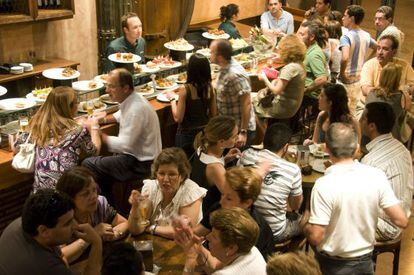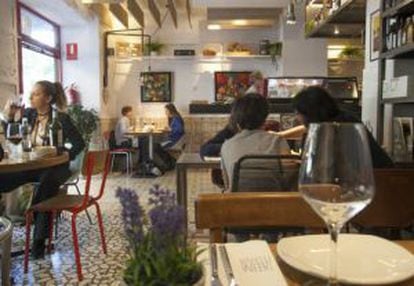Turning down the volume in Spain’s noisy bars and restaurants
A new campaign is aiming to encourage more eateries to create quieter environments

It’s probably happened to you before: you go to a restaurant with a group of people, you sit down and start talking at a normal volume.
But little by little, the place fills up, you stop hearing what your friends are saying, and you end up having to scream just to make yourself heard.
In schools and hospitals, excessive noise prevents students from concentrating and patients from getting the rest they need”
Svante Borjesson, Oír es Clave
You finally walk out feeling like you’ve spent the evening at a fairground and missed half of the conversation.
The progressive volume increase caused by the reverberation of sound inside an enclosed space has a name: “the café effect.” And it is not so hard to prevent.
“Spain is the second loudest country in the world, after Japan,” says Svante Borjesson, director general of the Oír es clave Foundation, which works with people with hearing problems. “Noise and acoustic pollution have an effect on our everyday life and negatively impacts everyone, not just those with hearing problems.”
In order to raise awareness about the issue, the foundation has developed a project called Comer sin ruido (or, Eating without noise), aimed at restaurant and bar owners who want to create friendlier environments for their patrons.

“The café effect does not just happen at bars and restaurants,” says Borjesson. “I am even more concerned about schools and hospitals, where excessive noise prevents students from concentrating and patients from getting the rest they need.”
“And that’s without even talking about the workplace, where noise has a great impact on productivity. But we decided to start with bars and restaurants, because it’s an attractive area where it’s easier to make an impact,” he adds.
The Comer sin ruido website features a list of 20 restaurants that have adopted the necessary measures to reduce noise levels, including placing sufficient space between tables, installing proper soundproofing in lounge and bar areas, avoiding clatter in the kitchen and playing music at a reasonable volume.
The idea is for restaurants themselves to become aware of the problem and self-regulate.
“We would like to see travel guides such as Michelin and Repsol take this factor into account,” says Borjesson. “Auditory comfort should also be an important part of a restaurant review and get a mention. We’re working on it.”
Despite the prevailing belief that the loud volume inside many Spanish bars and restaurants is simply a national idiosyncrasy, Borjesson believes that a lot of it has to do with poor building materials – or using the wrong ones altogether. Cement and marble, for instance, are not porous and do not absorb sounds well, while wood does. But wood is not widely employed in Spain.
“It’s hard to raise awareness about the danger of noise pollution, but we’ve made a lot of progress,” says Borjesson. “People are making efforts, and you see more and more establishments with sound baffles [to reduce reverberation] on the ceiling, for instance. You don’t need a decibel meter to figure out if a place has done its homework or not. If you have to raise your voice to make yourself heard, it has not.”
English version by Susana Urra.










































